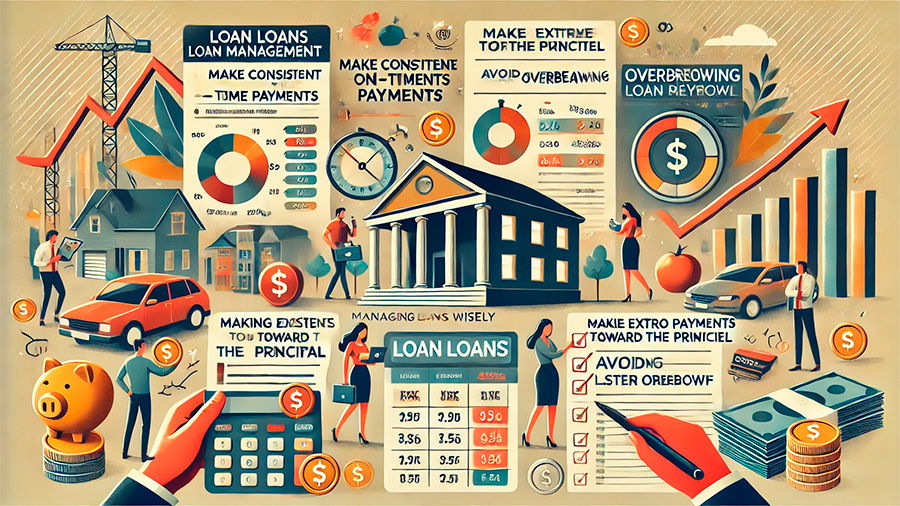Loans are often perceived as a necessary burden, but when approached strategically, they can be a powerful tool for building wealth and achieving long-term financial stability. By using loans to invest in appreciating assets, such as real estate or education, you can create opportunities for financial growth that might otherwise be out of reach. This guide will walk you through the process of using loans effectively to build wealth, offering insights into how to maximize the benefits of borrowing while minimizing risks.
Understanding how to leverage loans begins with recognizing their potential beyond mere debt. When managed wisely, loans can provide the capital needed to make significant investments that yield substantial returns over time. Whether you’re looking to buy property, invest in your education, or start a business, loans can play a crucial role in setting the foundation for financial success.
Step 1: Identifying Wealth-Building Opportunities
The first step in using loans to build wealth is identifying the right opportunities to invest in. Not all loans contribute to wealth creation, so it’s essential to focus on borrowing for assets that appreciate over time or generate income. Real estate is a prime example, as property values generally increase over time, allowing you to build equity. Purchasing a home with a mortgage not only provides a place to live but also serves as a long-term investment that can grow in value.
Investing in education is another way loans can contribute to wealth building. Student loans, when used to finance a degree in a high-demand field, can lead to higher earning potential and greater career opportunities. This investment in yourself can pay dividends in the form of increased income, which can be used to pay off the loan and still leave you with a substantial financial return.
Starting or expanding a business with the help of a loan is another avenue for building wealth. Business loans provide the capital needed to launch new ventures, invest in new technologies, or expand operations. A successful business can generate significant profits, allowing you to repay the loan and continue growing your wealth.
Step 2: Choosing the Right Loan
Once you’ve identified the wealth-building opportunity, the next step is choosing the right loan to finance it. Not all loans are created equal, so it’s important to select a loan that aligns with your financial goals and offers terms that are manageable within your budget. Factors to consider include interest rates, repayment terms, and fees.
A fixed-rate loan is often a good choice for those seeking stability, as it offers predictable payments that won’t change over time. This can be especially beneficial when financing long-term investments like a home or business. On the other hand, variable-rate loans may offer lower initial rates, but they come with the risk of increasing payments if interest rates rise.
The length of the loan term is another important consideration. Longer terms typically mean lower monthly payments, but they also result in more interest paid over the life of the loan. Shorter terms may require higher monthly payments, but they allow you to pay off the loan faster and reduce the total interest paid. It’s essential to choose a term that fits your financial situation and long-term goals.
Understanding the Costs of Borrowing
In addition to the interest rate, it’s important to understand all the costs associated with borrowing. These can include origination fees, closing costs, and any prepayment penalties. Being aware of these costs upfront allows you to better compare loan options and choose the one that offers the best value.
It’s also important to consider the impact of the loan on your cash flow. Even if a loan offers favorable terms, it’s crucial to ensure that the monthly payments are affordable and won’t strain your budget. Overextending yourself can lead to financial stress and make it difficult to achieve your wealth-building goals.

Step 3: Managing Loans Wisely
Once you’ve secured a loan, managing it wisely is key to ensuring that it contributes to your wealth-building efforts. This begins with making consistent, on-time payments. Missing payments can lead to penalties, higher interest rates, and damage to your credit score, which can make future borrowing more difficult and expensive.
Another effective strategy is to make extra payments on the loan principal whenever possible. Reducing the principal balance can lower the amount of interest you pay over the life of the loan and help you pay off the debt faster. Even small additional payments can make a significant difference, particularly with long-term loans like mortgages.
It’s also important to avoid taking on more debt than you can comfortably manage. While it may be tempting to borrow as much as possible, it’s essential to consider your ability to repay the loan without compromising your financial stability. Overborrowing can lead to financial strain and make it more difficult to achieve your long-term wealth-building goals.
Refinancing and Debt Management
As your financial situation changes, it may be beneficial to refinance your loan to secure better terms. Refinancing allows you to replace your current loan with a new one that offers a lower interest rate, reduced monthly payments, or a shorter repayment term. This can save you money and make your loan more manageable, freeing up resources for other investments.
In addition to refinancing, it’s important to have a plan for managing your overall debt. This might involve consolidating multiple loans into a single payment, prioritizing high-interest debt, or creating a budget that ensures all your financial obligations are met. Effective debt management is crucial for maintaining financial stability and ensuring that loans contribute positively to your wealth-building efforts.
Step 4: Leveraging Loans for Long-Term Success
The final step in building wealth with loans is leveraging them for long-term financial success. This involves using the assets purchased with loans to generate income or increase in value over time. For example, if you’ve taken out a mortgage to buy a home, consider how you can use the property to generate additional income, such as renting out a portion of it or using it as a vacation rental.
If you’ve used a loan to invest in education, focus on maximizing the return on that investment by pursuing career opportunities that offer the highest earning potential. This might involve seeking promotions, switching to a higher-paying field, or pursuing additional certifications or degrees that can further enhance your career prospects.
For business owners, leveraging a business loan effectively means reinvesting profits into the business to drive growth and increase profitability. This might involve expanding operations, investing in new technologies, or exploring new markets. The key is to use the loan as a stepping stone to greater financial success, rather than simply as a means to an end.
Building Wealth Through Compound Growth
One of the most powerful ways to build wealth with loans is by taking advantage of compound growth. This involves using the returns generated by your investments to further grow your wealth over time. For example, if you’ve used a loan to purchase an investment property, the rental income generated can be reinvested in additional properties or used to pay down the loan faster, increasing your equity.
Similarly, if you’ve taken out a loan to start a business, reinvesting the profits back into the business can lead to exponential growth, creating a positive feedback loop that accelerates your wealth-building efforts. The key is to think long-term and focus on how each investment can contribute to your overall financial success.
Building wealth with loans is a strategic process that requires careful planning, disciplined management, and a focus on long-term success. By identifying the right opportunities, choosing the best loans, managing debt wisely, and leveraging investments for growth, you can use loans to create lasting financial stability and achieve your wealth-building goals. Whether you’re investing in real estate, education, or a business, loans can be a powerful tool for creating the financial future you desire, provided they are used with foresight and responsibility.





